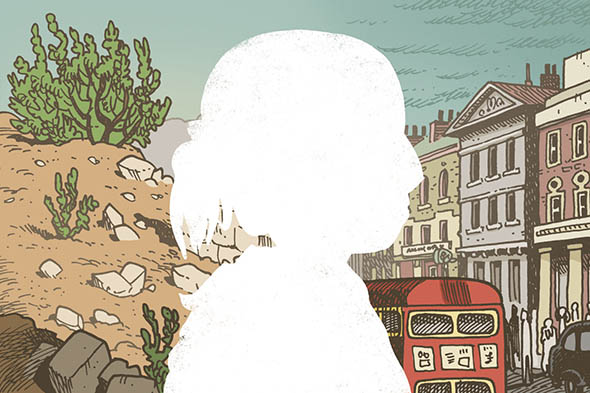
Slate is an Amazon affiliate and may receive a commission from purchases you make through our links.
Whose Fault?
Owen Sheers’ new novel spins a disquieting web of complicity, guilt, and blame.

Illustration by Kevin Cannon
When someone we love dies, we often say that we have lost them. It’s a comforting expression, almost hopeful. Lost objects can often be found again, no matter how long they’ve been gone. Simultaneously, however, the phrasing implies a disquieting degree of agency—the dead are not simply misplaced; we have misplaced them. To say that we’ve lost someone, then, is to imply that we are somehow at fault, as if we contributed to their fate.
It’s fitting that Owen Sheers’ new novel, I Saw a Man, which is preoccupied with loss, worries most over questions of responsibility. When we first meet Sheers’ protagonist, Michael, he is newly bereaved, having “lost” his journalist wife to a poorly planned drone strike. Before long, he becomes partially responsible for someone else’s tragic death, and from there the culpability spreads like a contagion. Guilt, Sheers suggests, is the other side of grief. Both are feelings that remake the world.
Michael spends almost half the book wandering through a seemingly empty house on the edge of London’s Hampstead Heath. It’s not his own—it belongs instead to his neighbors Josh and Samantha—but he is very much at home there. As Michael works his way from room to room in search of a screwdriver he’d lent Josh, he rifles, too, through the detritus of his life and other lives that have touched on his, trying to make sense of the forces that brought him here. The peripheral characters are complex and fully realized, at least in Michael’s imagination, but they come to life most vividly when they brush up against one another.
This fact makes Michael’s solitary explorations all the more poignant. The emptiness of the house is an obvious but powerful figure for the void opened up by the death of his wife, Caroline. “Her absence,” Sheers writes, “had been the most certain thing he’d ever known.” The end of her life is similarly absent from the novel itself, at least initially: One chapter ends with her preparing to leave for Pakistan, while the next opens in the immediate wake of her death, the event itself slipping into the cracks between them.
Sorrow swallows language, deforming or disabling the tools we use to make sense of the world. Consider how difficult it can be to simply acknowledge the pain of others. When Michael first tells his new neighbors about Caroline, Josh is all but dumbstruck, repeating, “That’s terrible … Just terrible.” A rich and evocative word, one that suggests deep fear, terrible here simply means something like “crappy.” Stripped of its fullness, consolatory language is almost always inadequate to its object. As such, it inevitably establishes a distance between us and those we seek to comfort.
Sheers’ own language is consistently rich and engaging, precisely calibrated to the circumstances he’s describing. Look at the scene in which Michael, climbing Josh and Samantha’s stairs, suddenly becomes convinced that his dead wife is somehow with him in the house—“not a ghost,” as he explains later, but present all the same. Sheers describes the phenomenon in precise and clipped clauses, the stuttering arrhythmia of a suddenly accelerated heartbeat, slowing as it goes: “He’d felt her with absolute experience. And he still could. It was fading, the resonance cooling, but it was there, as if he were slowly walking backwards from a fire, retreating into a cold night.” In this novel, death too is that which retreats, even as we retreat from it, creating chasms that no words can bridge.
But if grief is what divides, guilt is paradoxically what brings us together again, pulling bodies and lives together by dint of its unbearable gravity. Just over a third of the way through the novel, Sheers departs from its London environs to visit Maj. Daniel McCullen in a Las Vegas suburb. This shift of locale is inexplicable at first, but it soon becomes clear that Daniel is the drone pilot who launched the missiles that killed Caroline. Though Michael never meets the major, except in a series of letters they exchange, Daniel’s complicity binds them to each other. Later, Michael’s pursuit of the phantasmal Caroline leaves him similarly complicit in another tragedy. In this, Sheers proposes, Daniel shares some of the blame. Indeed, it is precisely because Daniel has reached out and taken responsibility for the crime that Michael loses track of himself and commits one of his own. Caught up as Daniel is in the networks of guilt, Michael’s actions become “the furthest ripple of [Daniel’s] Hellfire’s blast, the most recent echo of his killing.”
In more ways than one, guilt in I Saw a Man constitutes a collective body, a living thing. Though Josh helps Michael recover from Caroline’s death, he also shares—in a distant way—some responsibility for the tragedy. He is an employee of Lehman Brothers Holdings, which owns a significant stake in L-3 Communications, which manufactures some of the sensor equipment in the very missiles that killed Caroline. Indirectly, then, Josh abets his friend’s sorrow. He is even more directly at fault for the events that Michael later initiates, and their mutual guilt connects them more closely than ever.

Photo courtesy of the author
Drone warfare offers a powerful avatar for the necessity of such reconnection. Like Las Vegas—where, as Sheers notes, the world’s landmarks are crammed together in miniature—drones bring elsewhere a little closer while still keeping it at a safe distance. They have, Daniel realizes, “[b]rought a version of the war to America. A close-up yet faraway version, a safe equivalent so they didn’t have to go themselves.” Of course distance is no excuse: Josh’s London-based division of Lehman Brothers may not have been responsible for the 2008 financial crisis—which unspools midway through the novel—but he and his family still benefitted from the company’s malfeasance. The tragedies that befall the couple are not punishment for those sins, but they are reminders of the way every action reverberates endlessly.
In a world characterized by near-universal guilt, blame arises as a compensatory fantasy, a way of assigning all responsibility to someone else and thereby relieving oneself. Josh in particular embraces this possibility, but the novel ultimately refuses to side with him. Exculpating oneself from guilt would in I Saw a Man mean unshackling oneself from others and sinking back into the loneliness of mere sorrow. Consuming as it is, guilt at least helps to reconnect sundered selves.
I Saw a Man treats guilt as a way of seeing, a lens that allows us to recognize otherwise lost bonds. As in his previous novel, Resistance, Sheers concerns himself with the ways we are entangled with our ostensible enemies, sometimes sharing the burden of their crimes and sometimes simply sharing their company. In both books, recognizing this interdependence entails taking responsibility for the things that brought you together. There as here, however, taking responsibility doesn’t just mean admitting one’s mistakes; it also involves caring for those who are tied to us. Fittingly, then, the best moments in I Saw a Man are also the quietest: calming conversations over glasses of wine, revealing walks in the park.
As it approaches its conclusion, I Saw a Man builds toward a metafictional twist, one that turns the novel as a whole into a caring admission of responsibility. It is a testament to Sheers’ skill that this ending feels largely unnecessary. In bringing his novel to an end, Sheers merely demonstrates again what he has already shown throughout: Though we can’t recover those we’ve lost, we can still find each other.
---
I Saw a Man by Owen Sheers. Nan A. Talese.
See all the pieces in this month’s Slate Book Review.
Sign up for the Slate Book Review monthly newsletter.
